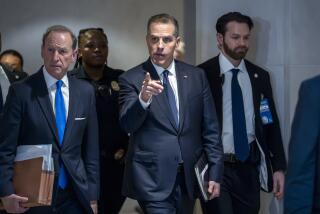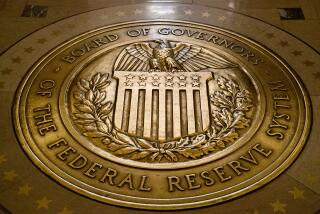Rohatyn Asks to Be Withdrawn From Consideration for Fed Post
WASHINGTON — New York investment banker Felix Rohatyn on Monday asked President Clinton to withdraw his name from consideration as a candidate for the vice chairmanship of the Federal Reserve Board.
Rohatyn made the request in a letter sent to the White House after determining that he could not win the approval of Republicans on the Senate Banking Committee, some of whom have attacked him in recent days as a proponent of liberal, big-government economic policies.
“I stopped believing in miracles a long time ago,” Rohatyn said when reached Monday night by phone. He said friends from both parties had convinced him that congressional hearings on his nomination would have proved “extraordinarily divisive, extraordinarily contentious, and I didn’t want to impose that on the president, on the country or on the Fed.”
At the request of White House Chief of Staff Leon E. Panetta, Rohatyn agreed to delay signing the letter requesting his withdrawal. White House spokesman Michael McCurry said Monday night that Clinton, who strongly supports the New York financier’s candidacy for the Fed job, wanted more time to win over the committee.
“The president has the highest regard for Felix Rohatyn and thought the nation would benefit from his service on the Fed,” McCurry said. However, he said the president recognizes that “given the current political climate in Washington,” prospects for Rohatyn’s appointment are bleak.
The investment banker’s nomination for the Fed job ran into trouble on Capitol Hill last week after Senate Republicans, led by Connie Mack of Florida, attacked Rohatyn as a big-government liberal who favored raising taxes and federal meddling in the free market. Mack chairs the Joint Economic Committee and is an influential member of the banking panel, which would hold the confirmation hearing.
“This nominee is the antithesis of the president’s latest slogan, ‘The era of big government is over,’ ” Mack said in a statement.
Rohatyn’s defenders said the financier is an outspoken advocate of balanced budgets and that his writings about the noninflationary growth potential of the economy bear a striking resemblance to statements by both supply-side conservative Jack Kemp and Senate Majority Leader Bob Dole (R-Kan.). Fed Chairman Alan Greenspan himself at one time advocated a gasoline tax increase.
Rohatyn declined to respond to the criticisms of his positions Monday night. “I’ve had a long public career,” he said. “My record is what it is.”
Nonetheless, Mack’s objections persuaded Senate Banking Committee Chairman Alfonse M. D’Amato (R-N.Y.) to block Rohatyn’s appointment, and other Republican members agreed to follow the chairman’s lead, Republicans on the panel said Monday.
One Republican member of the committee said Rohatyn’s nomination could have been salvaged had Greenspan--who is said to be on friendly terms with Rohatyn--intervened on his behalf. “If Greenspan were to call around and say, ‘Hey, this guy’s a convert, he’s repudiated his past writings and I want him with me,’ then maybe Rohatyn might have had a prayer,” said the senator, who asked that he not be named.
But a senior administration official dismissed that suggestion, arguing that it would be presumptuous for Greenspan, with his own reappointment hanging in the balance, to lobby members of Congress on behalf of other nominees.
White House officials said Monday that partisan politics, not concern about Rohatyn’s record, is what scuttled the financier’s nomination.
Administration officials had attempted to smooth the way for Rohatyn’s appointment by pairing with it with the renomination of Greenspan to another four-year term as chairman. Greenspan, a Republican economist who has won acclaim in financial markets for his emphasis on fighting inflation, would be quickly approved for a third term should he be nominated by the White House.
With Republicans in control of the Senate, administration officials feel they have little choice but to renominate Greenspan. The Fed chairman will remain in office even after his official term has expired unless his replacement has been confirmed by the Senate. Greenspan’s term expires March 2.
More to Read
Get the L.A. Times Politics newsletter
Deeply reported insights into legislation, politics and policy from Sacramento, Washington and beyond. In your inbox three times per week.
You may occasionally receive promotional content from the Los Angeles Times.










